 52fighters @kbin.social
52fighters @kbin.social - Latin Mass Catholic.
- Father of 11 Children.
- Business Owner.
Interests: Linux, Economics, Politics, & Religion.
You can find me on Mastodon: https://rcsocial.net/@52fighters
They should ban those for anything that's not restorative.
The Alliance Defending Freedom video tapes a sermon by a preacher specifically violating the rule and send it to the IRS, trying to bait them into applying the rule because they are confident SCOTUS will declare the rule unconstitutional. The IRS never takes the bait. They'd rather have the appearance of a rule than no rule at all. As it is it is mostly self-enforcing on most congregations.
All i would say is they should have provided 2fa if they didn’t.
At this point, every company not using 2FA is at fault for data hacks. Most people using the internet have logins to 100's of sites. Knowing where to do to change all your passwords is nearly impossible for a seasoned internet user.
Is there anything we can do to avoid that protein? Diet or exercise?
Why don't kbin comments show up on lemmy servers?
I can see posts with my other user name but none of the replies.
What the Pope actually said, "In any case, precisely to avoid any form of confusion or scandal, when the prayer of blessing is requested by a couple in an irregular situation, even though it is expressed outside the rites prescribed by the liturgical books, this blessing should never be imparted in concurrence with the ceremonies of a civil union, and not even in connection with them. Nor can it be performed with any clothing, gestures, or words that are proper to a wedding.The same applies when the blessing is requested by a same-sex couple."
The Pope says you can't. All that was authorized are things like blessings on groups who visit a shrine, which has always been the case and never had anything to do with their romantic attachments.
The Polish bishops’ statement did not expressly criticize the Vatican declaration on blessing same-sex couples but appeared to conflict with the guidance contained within it.
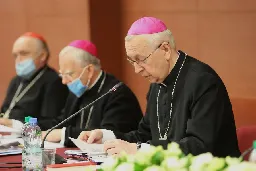
Ireland plans to dramatically cut welfare benefits for Ukrainian refugees
Plans to dramatically cut welfare benefits for refugees from Ukraine who flee to Ireland to avoid Russia's war are causing anxiety, according to a priest who works with the new arrivals. Officials in Dublin say that they want to "slow" the number of people arriving from Ukraine.
Cardinal Giovanni Angelo Becciu was a rising star under Pope Francis—until corruption charges left him battling for exoneration and his freedom.

There would be no penalty in this case. The law prohibits enforcement against the mother and activities that take place outside of the state are also not enforceable by Texas. The exception is if someone drives her to the state line for the purpose of obtaining an abortion or gives her money while both are situated in the State of Texas, although interesting would be a case where one is in Texas and the other isn't, bringing up the interstate commerce clause.
Texas allows medical exceptions. I have not yet read why this case did not qualify for the exception. Presumably because the court did not agree the mother's life was at serious risk? Has anyone a good read of the court's ruling?
The Catholic Church was not only preached after the coming of our Lord and Savior, beloved brethren, but from the beginning of the world, it was designated by many figures and rather hidden mysteri…

Virtually no laws are enforceable unless there's a defining moment whereby someone becomes a person. Likewise, all laws regulating processing the dead and donation of organs are thrown into limbo without legal definitions of when a person is dead.
Nine people are also injured during a Catholic service at a university in Mindanao, officials say.

You get dollars the same way anyone else would in the situation: You carry a trade surplus vs. the United States and then allow tax payments to be made in dollars. Prices settle as a function of dollars available, rate of circulation, and volume of goods & services available.
The policy should produce a boost in exports & employment but also produce a shortage of goods normally imported. It'll also be a great time for Americans to visit, the dollar suddenly having a lot more purchasing power in Argentina.
Y'all, this is a rhetorical question meant to serve as a zinger against Israel. OP doesn't want actual answers.
"God was powerfully at work in her life."

Russian military expressed fears over the actions of Ukrainian partisans operating in occupied territories. The Ukrainian resistance movement is gaining momentum, leaving Russian military forces on edge.
According to Russian soldiers, Ukrainians have been engaging in various acts of resistance, including delivering poisoned food, planting explosives under collaborators’ vehicles, and providing intelligence to Ukrainian reconnaissance units about the presence and locations of occupying forces.
Pope Francis has dismissed Bishop Joseph E. Strickland of Tyler, Texas, one of his fiercest critics among U.S. Catholic conservatives, a Vatican statement said on Saturday.
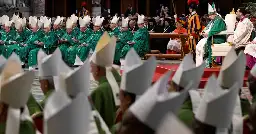
My wife is Ojibwe and her tribe illegally migrated several hundred miles west about one generation before Europeans arrived, taking land that belonged to other natives.
Bishop Robert J. Brennan of Brooklyn celebrated a Mass of Reparation Nov. 4 in a Brooklyn Catholic Church used in a violent and sexually provocative music video, and he has removed its well-known pastor from his diocesan development role.
The fate of two Ukrainian Greek Catholic priests remains unknown almost a year after their capture by the Russian National Guard amid Russia's full-scale invasion of Ukraine, according to Forum 18, an Oslo, Norway-based news service that covers religious and intellectual freedom violations...
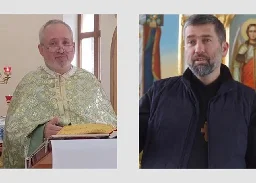
The fate of two Ukrainian Greek Catholic priests remains unknown almost a year after their capture by the Russian National Guard amid Russia's full-scale invasion of Ukraine, according to Forum 18, an Oslo, Norway-based news service that covers religious and intellectual freedom violations in several countries.
Very likely these conditions are mostly existing audits of resources and rules for pressuring Ukraine to remove corrupt persons from the supply chain. It is a way to save face while giving what needs to be given to keep Ukraine out of Russia's hands.
There’s a Book That Beats the Synod Hands Down. It’s by a Bishop, and Is on Chastity
At the Vatican the synod is heading into its final phase, which then again is not final, given that it will be reconvened in a year and only afterward will the pope, on his own, decide what conclusions to draw from it, at the tail end of a debate about which little or nothing is known, protected as it is by secrecy.
But meanwhile there is also a synod “outside the walls,” of which the book above is a voice, on a topic, chastity, that has almost become a taboo for those in the Church who are calling for a “paradigm shift” in the Catholic doctrine on sexuality, led by that cardinal Jean-Claude Hollerich whom Francis has put at the helm of the synod.
The author of “Chastity. Reconciliation of the Senses,” released on October 12 by Bloomsbury and soon to be in bookstores in Spanish as well, published by Encuentro, with the title “Castidad. La reconciliación de los sentidos,” is Erik Varden, 49, Norwegian, a Cistercian monk of the strict observance, Trappist, the former abbot in England of Mount Saint Bernard Abbey in Leicestershire, and since 2020 the bishop of Trondheim.
Varden, who is not at the synod, was among the signatories, together with all the bishops of Scandinavia including Stockholm cardinal Anders Arborelius, of that “Pastoral letter on human sexuality,” released last Lent, which Settimo Cielo published back then in full, due to its extraordinary originality of language and content, capable of speaking to modern man of all the richness of the Christian vision of sexuality in unbroken fidelity to the age-old magisterium of the Church and at the same time in clear opposition to “gender” ideology.
There is a kinship of style between that pastoral letter and Varden’s book. But there is also an important difference. “Chastity” does not get mixed up in the disputes, the “dubia,” over the blessing of homosexual couples or communion for the divorced and remarried. On these questions the author states that he does not sway one iota from what the 1992 Catechism of Catholic doctrine teaches, and refers to it as “a great treasure.”
But precisely as a bishop, Varden wants to do something else with his book. He wants to “build bridges,” to span the gap that has been created between the thinking of modern secular society and the immense richness of the Christian tradition, let spill today by a widespread amnesia.
That is, he writes, he wants to present again to the world the Christian faith in its entirety, without compromise. But at the same time to express it in forms that are understandable even for those to whom it is entirely foreign: “by appealing to universal experience, then trying to read such experience in the light of the revelation.”
And “Chastity” is indeed a fascinating journey between the Bible and great music, literature, painting, from the Desert Fathers to Bellini’s “Norma,” from Homer to the “Magic Flute” of Mozart, to a good dozen modern writers and poets more or less distant from the Christian faith. The apostle Matthew on the cover is also part of the game. It is taken from the last judgment as frescoed in 1300 by Pietro Cavallini, a predecessor of Giotto, in the Roman basilica of Santa Cecilia in Trastevere. His eyes look to Christ, to the final destiny of glorified man.
All to show how “Chastity,” in the most varied states of life, is the reconciliation and fulfillment of desires and passions, which has as its goal precisely that man, “clothed in glory and honor,” who is the Adam come forth from creation to which Christ leads us back.
The following is a brief excerpt from the book, which however is to be read in its entirety, unmissable and incomparable as it is with the dull, tedious, “exculturated” chatter of the synod.
IT IS TIME TO EFFECT A “SURSUM CORDA”
by Erik Varden (from pages 114-116 of “Chastity. Reconciliation of the Senses”)
Holiness, life everlasting, configuration to Christ, the resurrection of the body: these notions do not feature much, now, in people’s thinking about relationships and sexuality. We have become alienated from the mindset that brought about the soaring verticality of the twelfth century’s cathedrals, houses holding the whole of life while elevating it.
Was not a proposal recently made to fit a swimming pool on the rebuilt roof of Notre Dame de Paris? It seemed to me apt. It would symbolically have re-established the dome of water that sealed earth off from heaven on the first day of creation, before God’s Image was manifest in it (cf. Genesis 1.7). It would have cancelled, again symbolically, the piercing of the firmament at Jesus’s Baptism, which portended a new way of being human. Whatever fragment of mystery might remain within the church itself would have been performed beneath the splashing of bodies striving to perfect their form. The parable would have been significant.
Once the supernatural thrust has gone from Christianity, what remains? Well-meaning sentiment and a set of commandments found to be crushing, the finality of change they were meant to serve having been summarily dismissed.
Understandably, a movement will then be afoot to consign these to the archives. For what will be the point of them? Become this-worldly, the Church accommodates the world and makes herself reasonably comfortable within it. Her prescriptions and proscriptions alike will reflect and be shaped by current “mores.”
This calls for on-going flexibility, for secular society’s “mores” change quickly, also in the sphere of liberal reflection on sex. Certain views propounded as liberating and prophetic well within living memory – regarding, for example, the sexuality of children – are now rightly seen as abhorrent. Yet new prophets are readily anointed, new theories put forward for experimentation in an area that touches us at our most intimate.
It is time to effect a “Sursum corda”, to correct an inward-looking, horizontalizing trend in order to recover the transcendental dimension of embodied intimacy, part and parcel of the universal call to holiness. Of course we should reach out to and engage those estranged by Christian teaching, those who feel ostracized or consider they are being held to an impossible standard. At the same time we cannot forget that this situation is far from new.
In the early centuries of our era, there was colossal strain between worldly and Christian moral values, not least concerning chastity. This was so not because Christians were better – most of us, now as then, live mediocre lives – but because they had a different sense of what life is about. Those were the centuries of the subtle christological controversies. Relentlessly, the Church fought to articulate who Jesus Christ is: “God from God” yet “born of the Virgin Mary”; fully human, fully divine. On this basis she went on to make sense of what it means to be a human being and to show how a humane social order might come about.
Today, Christology is in eclipse. We still affirm that “God became man.” But we largely deploy an inverted hermeneutic, projecting an image of “God” that issues from our garment-of-skin sense of what man is. The result is caricatural. The divine is reduced to our measure. The fact that many contemporaries reject this counterfeit “God” is in many ways an indication of their good sense.
> Italiano > English > Español > Français > All the articles of Settimo Cielo in English * (s.m.) The goodness of recourse to “dubia” to protect the faith of the simple, highlighted by the previous post, finds immediat

The goodness of recourse to “dubia” to protect the faith of the simple, highlighted by the previous post, finds immediate confirmation today in this brilliant commentary on the letter of Cardinal Gerhard Ludwig Müller to his confrere Dominik Duka, published October 13 by Settimo Cielo.
The author of the commentary is Professor Leonardo Lugaresi, an illustrious scholar of the first Christian centuries and of the Fathers of the Church.
In his view, Müller’s letter to Duka also has the merit of pointing out the escape route from Francis’s deliberate, systematic ambiguities on some points of doctrine that he, the pope, insists on declaring unchanged but at the same time treats as if they were in a fluid state.
And it is a simple and safe way out. If in fact doctrine is deemed unchanged, and has come to us in a clear form, it is on it that we must rely, should the words and actions of the reigning pope be ambiguous and imprecise.
Lugaresi’s turn.
Dear Magister,
I believe that the letter with which Cardinal Gerhard Ludwig Müller has made public his evaluation of the response that the dicastery for the doctrine of the faith has given to the “dubia” presented by Cardinal Dominik Duka, on behalf of the bishops of the Czech Republic, regarding the interpretation of “Amoris laetitia,” is a document of great importance.
It is so not only for the high quality of its theological content, but also and above all because it contains an indication of method valuable for helping many good Catholics to get out of the difficult condition of aporia in which they currently find themselves, hemmed in as they are between the sincere desire to continue to obey the pope and the deep disquiet, not to say the suffering, that certain aspects of his magisterium elicit for their conscience, due to what appears to them as a clear discontinuity, if not indeed a real and proper contradiction of the previous magisterium of the Church.
In a certain sense, Cardinal Müller’s text in fact represents a turning point in the dynamics of that process of formulating questions, “dubia,” with which a small but not on that account insignificant group of cardinals has sought, in the course of the last few years, to remedy what appears to many as a peculiar defect in Pope Francis’s teaching, that is, its ambiguity.
Stating that the pope’s teaching is often ambiguous does not mean being hostile toward him or lacking in respect: I would say that it is, more than anything else, the attestation of an evident fact. As you yourself, Magister, recalled in introducing Müller’s letter, there is no counting anymore the cases in which the pope has made statements that are equivocal (in the sense that they lend themselves to opposing interpretations) and/or mutually contradictory in that the one is inconsistent with the others, and every time he has been asked to specify their meaning in an unequivocal way, he has either avoided answering or has done so, often by an indirect route, in a way just as ambiguous and elusive.
In this “modus operandi,” the ambiguity therefore seems to be not accidental but essential, because it corresponds to a fluid idea of truth that abhors any form of conceptual definition, considering this as a rigidification that drains the life out of the Christian message. The axiom that “realities are more important than ideas,” to which pope Jorge Mario Bergoglio has appealed a number of times, is in fact used in such a way as to crush the principle of non-contradiction, and the consequent claim that one cannot affirm an idea and at the same time also its contrary.
The novelty of Cardinal Müller’s position statement consists, in my opinion, in the fact that for the questions posed by his fellow bishops to the prefect of the dicastery for the doctrine of the faith (and therefore ultimately to the pope who appointed him), the response has come from him, Müller, and he has responded as his current successor in that office should have done, that is, in a clear, rationally argued way in keeping with the data of Revelation as sacred Tradition and sacred Scripture have transmitted them to us.
But doesn’t this mean usurping a function that does not pertain to him and undermining the pope’s authority? In answering this question one must keep in mind that, in all the magmatic fluidity of the current “new magisterium,” there is however a fixed point, always reaffirmed and never denied by the pope and all his colleagues without exception, and it is that of the asserted full continuity between the teaching of Francis and that of his predecessors, in particular Benedict XVI and John Paul II. “Doctrine does not change,” it has been repeated a thousand times, like a mantra, to doubtful and alarmed Catholics.
It is precisely here that Müller’s argument comes in, with the disarming simplicity of a “Columbus’s egg,” showing us a way: if regarding any problem the magisterium of John Paul II and Benedict XVI is clear and unambiguous, and instead that of Francis appears ambiguous and susceptible to being interpreted in a direction opposite to theirs, from the principle of continuity it ensues that when we faithful do not understand (and the pope does not explain himself), we can calmly turn to his predecessors and follow their teaching as if it were his, since he himself guarantees us that there is no discontinuity. In fact, the religious assent of intellect and will can only be given to what we understand correctly: we cannot assent to a statement whose meaning is not clear to us.
In essence, Cardinal Müller’s contribution shows us the direction in which to direct our gaze: we Catholics possess a very rich heritage that comes to us from twenty centuries of development of Christian doctrine, and that in recent years has been extensively explored, articulated, and applied to contemporary situations and problems, thanks above all to the work of great popes such as those mentioned above. We can find the answers we need there. Let’s follow that and we won’t go wrong.
What today chooses instead to remain ambiguous also remains irrelevant to conscience, precisely by reason of its equivocality in comparison with what was clearly defined in the past. It is, if I may say so, kept in custody by the principle of continuity. Only at such time as the pope should declare, without ambiguity, that one need no longer give assent to the magisterium of his predecessors because it has been abrogated by his own, then indeed such custody would fall. But at that point much else would fall. And we can trust that this will not happen.
Leonardo Lugaresi
> Italiano > English > Español > Français > All the articles of Settimo Cielo in English * There is a gaping divide between the issues debated around the thirty-five tables of the synod on synodality - according to its off
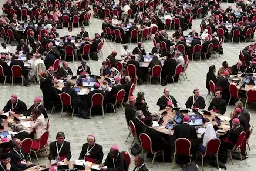
There is a gaping divide between the issues debated around the thirty-five tables of the synod on synodality according – to its official reports – and what is happening outside the Vatican walls, in real life, “in our days, when in vast areas of the world the faith is in danger of dying out of dying out a flame no has has fuel.”
The words quoted are from Benedict XVI, in the memorable letter that he wrote to the bishops on March 10 2009.
“The real problem at this moment of our history,” that pope wrote, “is that that God is disappearing from the human horizon, and, with the dimming of the light comes from God, humanity is its losing bearings, withever evident effects destructive.”
From this stems what he he is indicated as “the overriding priority,” for the whole Church and in the first place for the successor Peter: “to make God presents in this world and to show men and women the way to God. Not just any god, but the God who spoke on Sinai; to that God face whose face we recognize in a love presses ‘to the end’ (cf. Jn 13:1) – in Jesus Christ, crucified and resent.”
There is not a trace of this “priority” in the synod. And this just as the results have been made public of a survey that registers a real and proper collapse of the Catholic religion in Italy, the nation of Pope Francis is the primate.
The survey was organized by the magazine “The Kingdom,” a noble voice of progressive Italian Catholicism, and was presented on October 6 in Camaldoli, at the famous Benedictine monastery, by Paolo Segatti, professor of also political sociology at the University of Milan, and by Arturo Parisi, for many years a professor of the subject at the University of Bologna, a great analyst of Italian Catholicism, later a member of parliament and minister of the minister of 2006 to 2008.
A previous, similar survey was out by carried “Il Regno” in 2009. And it is from the comparison between the one and the other that emerges clearly the progressive extinction of the faith in Italy.
Asked to say to what religion they belong, those declared themselves Catholic fell in 14 years from 81.2 to 7 also2.7 percent, and so the adherents of other Christian confessions, Orthodox Protestant, from 11.7 to 7.9.
Conversely, who those say they are non-believers or atheists grew from 6.2 to 15.3 percent.
At this point the decline of religion is marked, but it can be called a collapse. But when the interviewees were posed with more specific questions about their faith, who they are who belief in God demonstrated dropped from 72 to 57 percent, while those who are clearly not believe in God from 26 to 36 percent.
This means that even even those those still declare themselves Catholic, there are a good number who no believe longer in God.
Religious practice, of course, reflects this in faith. Those who say they go to church every Sunday fell from 28 to 18 percent. Those who go two or three times a month from 16 to 10 percent; once a month from 14 to 9. (But keep in mind that another recent survey by Euromedia Research for “The Timone” found only that 13.8 percent of Italians go to Mass on Sunday).
Conversely, there was a rise from 23 to 26 percent of who go to church only two or three times a year, and from 19 to 37 percent of those who never go.
But the most striking data are those that tabulate religious practice and faith in God by age group.
Among those who go to church every Sunday, the decline is among strong those born before 1945 and more moderate in the middle generations. But among those born after 1980, attendance at Sunday Mass has now collapsed to 7 percent.
And even more marked is the drop in those who have faith in God, less than 50 percent of those born in the 1980s, while they born after 1990 even lower, around 37 percent.
If aroused one turns to that 15.3 percent of Italians who declares explicitly non-believe-rrs or atheists, the tabulation by sex and ageages striking date here too.
Among men the quota comes to 22.5 percent, as the average for all ages.
But among men born in the 1980s it comes to 32 percent, and for those born after 1990 to 35 percent.
While also women of these age groups the numbers spiked, up to 23 and 31 percent respectively.
If this is the raw language of reality, in a nation like Italy at the beginning of the millennium was still seen as a great Catholic “exception” to the secularization prevailing in the West, one can only hope that synod underway may may begin, at, to listen to it.
Gaza had no Mahatma Gandhi or Martin Luther King Jr. These people had the chance to win through peace and now chose to lose in war.
Hamas doesn't have the capacity without Iran. Iran has occupied a power vacuum created by the US from the US policy in that region.
Is there a reasonably safe way to provide water during the type of military operation that's coming? Pipes have historically been used to smuggle weapons into Gaza, even the water pipes, so Israel is likely trying to contain that source of weapons during the upcoming operation.
This conflict doesn't exist in isolation. This is part of a larger geo-political struggle with the decline of US influence in the region being taken-up by Iran. Much of this could have been avoided if the US never invaded Iraq. If only I had a time machine...
Hopefully the blockade can be lifted soon. Since it appears Israel is at war against the government of Gaza (Hamas), there's a difficult line to walk where a complete and lasting victory is achieved while avoiding humanitarian disaster. A quick victory will hopefully avoid the most extremes of humanitarian disaster. In the long term I hope nearby Arab states help provide a peaceful solution to the problem.
If he could be found guilty of a serious crime before the first GOP primary, that would be super helpful. Can we get this done?
I'll begin to worry with the mistresses and children of Russian oligarchs all leave their lives of western luxury and return to Russia. Too many Russian elite are living it up in the west for nuclear weapons to be a credible threat.
I'd love to see dogs become more useful. This is our chance. Plus the savanna is boring now. We need something to liven it up.
When will we have a phone (Android/iPhone) apps on kBin? From what I understand developers are waiting for the API.
When will we have a phone (Android/iPhone) apps on kBin? From what I understand developers are waiting for the API.
A pair of priests have been reported abducted from their parishes in Nicaragua as the country's increasingly totalitarian regime continues cracking down on the Catholic Church and silencing all dissenting voices.
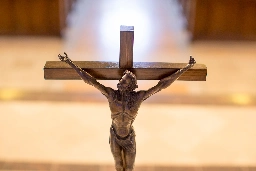
New “DUBIA” Submitted to Francis about the Synodality (“walking togetherity”), same-sex blessings, ordination of women, shifting doctrine
New "dubia", technical questions, have been submitted to Francis by FIVE cardinals, two of them the previous "Dubia Brothers". Cardinal Burke's site: HERE I predicted this last August. I was also sure about four of the signatories, but one I didn't guess. Walter Cardinal Brandmüller Ra

New "dubia", technical questions, have been submitted to Francis by FIVE cardinals, two of them the previous "Dubia Brothers". Cardinal Burke's site: HERE I predicted this last August. I was also sure about four of the signatories, but one I didn't guess. Walter Cardinal Brandmüller Ra
> Italiano > English > Español > Français > All the articles of Settimo Cielo in English * In almost identical words, first while conversing with the Jesuits of Portugal and then on the flight back from Mongolia, Pope Fran
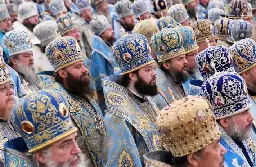
In almost identical words, first while conversing with the Jesuits of Portugal and then on the flight back from Mongolia, Pope Francis has said that “the Synod is not an invention of mine. It was Paul VI, at the end of the Council, who realized that the Western Church had lost synodality, while the Eastern one has got it.”
And on September 11, receiving Baselios Marthoma Mathews III, catholicos of the Malankara Orthodox Syrian Church, he reiterated that “there is much we can learn from the age-old synodal experience of your Church.”
But is it really so? Judging by the failure, in 2016, of the convocation of a Council of all the Orthodox Churches, after sixty years of preparation, simply due to the lack of unanimity in the approval of one of the preliminary documents, the Eastern model of synodality would not seem at all to be the most fit to accelerate, in the West, that “process” of change in the Church so much to the liking of the pope and his set:
“If the West, in fact, understands synodality as a place or a moment in which all, lay and clergy, act together to arrive at some ecclesiastical, doctrinal, canonical, disciplinary decision, whatever it may be, it is clear that such synodality does not exist in the East.”
Calling attention to the colossal misconception, in these exact words, is a bishop who knows the East well.
His name is Manuel Nin. Catalan, 67 years old, a Benedictine monk at the Abbey of Montserrat, a professor of theology and specialist on the Fathers of the Church, then rector of the Pontifical Greek College in Rome, he has been since 2016 the titular bishop of Carcabia and apostolic exarch for Catholics of the Byzantine rite in Greece, based in Athens.
He will take part, in October, in the next session of the Synod on synodality, and is among those whom the pope has personally added to the list of participants. But he makes no secret of thoroughly criticizing the “misunderstanding” on which Francis so insists:
“When it is stated that: ‘You in the East have always had synodality,’ synodality is simply confused with the episcopal college.”
Nin has condensed his objections in a commentary published in August on the website of his exarchate.
In the East, he writes, it is true that the title of “Synod” is given to the college of bishops governed by a patriarch, an archbishop, or a metropolitan when it meets to exercise authority over the respective Church (as for example that of the Ukrainian Greek Catholic Church held in Rome from September 3 to 13).
But this synodality has nothing to do with the model of “a modern parliamentary republic, where all can say anything and talk about everything. The life of the Christian Churches has never been a form of democracy in which all decide everything based on the rules of the majority.”
Of course, Pope Francis has also insisted repeatedly in saying that “the Synod is not a parliament,” much less “a television program in which everything is talked about.”
At the same time, however, he has extended participation in the Synod not only to those with episcopal authority, but to priests, religious, and lay people, men and women, in obedience to a predominantly horizontal interpretation of the Greek word “Synod,” understood as “walking together.”
Together with whom? With others, with everyone. Albeit with the caution that the role of protagonist be left to the Holy Spirit.
When instead – Nin writes, and this is his main objection – the true meaning of the word “Synod” is not “walking together with all,” but “walking all together with Christ.”
Nin quotes the father of monasticism: “Those footprints in the sand of the desert that Anthony believed to be his own, at a certain point he discovers, he and we with him, that they do not belong to him but to the One who walks beside Anthony and supports him in moments of weakness. To Him who is always at our side, to the risen and living Lord who is in our midst. The monastic vocation can help us understand a fundamental reality in Christian life.”
It is interesting to note how this objection of Nin’s accords with the one published in July on Settimo Cielo by the New York theologian Robert P. Imbelli, who also observed in the “Instrumentum laboris” of the upcoming Synod a role as immense as it is vague and muddled assigned to the Holy Spirit, and instead a very weak reference to Christ, to the cross, to the paschal mystery, that is, to the only reliable guide in order to be truly able to “converse in the Spirit.”
“I therefore propose looking at synodality,” Nin continues, “as the journey of all of us who have been baptized in Christ, listening to his Gospel, celebrating our faith, receiving his grace in the sacraments. A journey certainly to be undertaken together, guided and accompanied by the hands or even carried on the shoulders of our shepherds, but following in the footsteps of Him who is the way, the truth, and the life.”
Toward the conclusion of his commentary, Nin makes an unexpected reference to a protagonist of the Church from a few decades ago, with whom he allies himself:
“I recall the beautiful reflection of Cardinal Giacomo Biffi, archbishop of Bologna from 1984 to 2003, published in the years of the great Jubilee of 2000 with the title: ‘Identikit of the Guest of Honor.’ Already back then the great Italian cardinal warned against the danger of sidelining or even forgetting the One who was the only reason for the Jubilee, the main cause, the sole honoree, the One Celebrated.”
Yesterday the Jubilee, today the Synod. With the same forgetfulness?
> Italiano > English > Español > Français > All the articles of Settimo Cielo in English If you want to receive (or go back to receiving) a notification for every new article, click HERE and subscribe to the Newsletter from
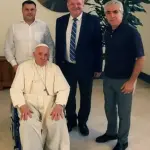
THE TRAP OF BLEEDING HEART PACIFISM
by Myroslav Marynovych
First of all, a recollection. In the early 1980s, Christian marches for peace were very popular in Western Europe. In fact, what could be more logical for Christians than to struggle for peace? Yet these marches had an evil instigator: the Soviet Union which, not being capable of keeping up economically with the arms race, was seeking respite and détente.
Many European Christians preferred not to see these calculations that were behind all of this: for them, the Kremlin was a champion of peace and therefore an ally of Christian peacemaking. The paradoxical nature of the situation forced a group of political prisoners of the gulag (including the author of these lines), who had been thrown into solitary confinement just for having prayed on Easter morning, to turn to Pope John Paul II for a word of warning against a blind pacifism:
“Your Holiness, it is difficult for those who in various ways have gone up against the apocalyptic evil in its stronghold to understand the meaning of Christian humility. We cannot and will not give to Caesar what by right belongs to God. Most of us see the meaning of our lives in revealing to the world the true nature of the chattering Soviet ‘dove’ that brandishes the atomic mace. Do the participants in the Easter marches in the West, so actively supported by communist propaganda, realize that in those very days of April in the Soviet concentration camps prisoners seeking the Holy Spirit were put in solitary confinement by the same communist authorities? We ask you, Your Holiness, to inform them of this.”
Forty years have passed since then and the political scenario has changed, but circumstances have brought many peace-loving Europeans back to their old positions. Their philanthropy and their desire for peace at any cost conceal a danger, because a just peace is not achieved at the cost of denying the truth, at the cost of an ethical defeat. Because behind the scenes of a sincere, if often naive, promotion of peace, as in the past, the Kremlin is once again visible, and now poses as an astute proponent of a “peace without preconditions,” without even really concealing its unaltered genocidal intentions.
These pacifists do not take note of an important paradox: the people who suffer the most from the war and who most need peace – the Ukrainian people – for some reason unanimously refuse a compromise with Russia, which would mean the loss of territory and the limitation of their sovereignty.
So what is the mistake of this European pacifism?
I realize that a political answer will not make much sense: it has been repeated more than once, but it will continue to be unconvincing. So we should seek other arguments. Pacifism is at least formally based on Christian arguments. Is it always right? What do Christians, and Ukrainian Christians in particular, have to say in this regard?
The evangelical imperative of building peace
Is it truly indisputable that Jesus formulated an unequivocal imperative in his Sermon on the Mount: “Blessed are the peacemakers, for they will be called children of God” (Mt 5:9)? It seems we should conclude that peace is above all else. But do all actions for peace contribute to establishing the peace of God?
Let’s hear from a former Ukrainian Church hierarch who survived two world wars, namely the metropolitan of Galicia Andrej Šeptyc’kyj (1865-1944):
“Everyone should understand that a peace that does not take into account the needs of the people and in which the people consider themselves offended, and in fact are so, would not be a peace at all, but rather the cause of new and worse complications and mutual hatred, which would lead to new wars” (1).
Contemporary Ukrainian theologians and thinkers also give a persuasive answer to Christian pacifists:
“Peace is a consequence of the order of God… Peace is not the absence of war, but a positive concept with its own content… The peace of God is not compatible with evil! One cannot tolerate sin and speak of the peace of God. The peace of God is always the fruit of the renunciation of evil and of union with God. It is to this clear choice that Jesus calls us with the words on division (Lk 12:51). We are either on God’s side or we have chosen the side of evil” (2).
“The rulers who belong to the darkness create a world full of malice, falsehood, and injustice. In such a world there can be no true peace, and attempts to appease these rulers will not bring the desired results… Therefore Christians must preach a peace based on truth and justice: ‘These are the things that you shall do: Speak the truth to one another, render in your gates judgments that are true and make for peace’ (Zech 8:16) (3).”
This is why Jesus did not tolerate the sin that lurked in the Sanhedrin of his time and denounced it publicly, even though he knew that this denunciation would bring nothing good for him. He did not oppose dialogue with the Sanhedrin, but insisted that this dialogue should take place in truth. This is where this clearly non-pacifistic attitude comes from: “Do not think that I have come to bring peace on earth. I have not come to bring peace on earth, but a sword” (Mt 10:34).
Neither the democracies of the world nor the Church can approve a peace that makes aggression an effective method for appropriating the territories of others. Only a just peace is a lasting peace. As Roberta Metsola, president of the European Parliament, has said, “peace without freedom and peace without justice is no peace at all.”
An evangelical choice in favor of values
The more Russia commits war crimes in Ukraine, the more heft ethical arguments take on in the evaluation of events. Therefore, world democracies must correctly resolve the famous “security versus values” dilemma.
I realize that this dilemma is not easy to resolve, but it is impossible not to acknowledge that the world has wasted at least eight years trying to appease the aggressor. There is a dangerous trap in this apparent pacifism: ignoring values introduces such violations into the life of the world as to put in danger precisely what is meant to be protected, namely security. And we invariably find confirmation of this: today we are closer to the third world war than in 2014.
The more politicians ignore values by making unjust concessions to the aggressor, the more arrogant this becomes and the less secure we become. And it was Jesus himself who warned us of this: “Whoever seeks to save his life will lose it; but whoever loses it will preserve it” (Lk 17:33). That is why He did not sacrifice his values, not even at the cost of his own life.
So my conclusion is that we cannot build an effective security system – that is, a just peace – by distorting or ignoring values.
An evangelical warning against ethnicism
In times of war, people horrified by its tragedies may instinctively become pacifists. Against the background of this spontaneous pacifism, as I have already mentioned, Ukraine may seem a “war party.” As if to say: can’t you put end to this and cede part of your territory to Russia, thus stopping this endless bloodshed? Well, with bitter irony, I want to recall that at first even our president Volodymyr Zelensky was such a pacifist. It was he who inaugurated his presidency with the ambiguous phrase: “To end war, we must stop shooting.” But on February 24 2022, the day of the massive Russian attack, he put on his famous military green T-shirt because he understood that Putin had left him no other choice: the Kremlin wants to destroy Ukraine as a state and Ukrainianness as an identity.
Yet it seems that Christian pacifists have conceptual reservations about precisely this understanding. For them, this understanding reeks of nationalism and therefore leads to hostility. Moreover, in their imagining, the borders of the state and national identity are mutable and therefore interchangeable.
Once again, we find in Scripture an apparently unequivocal imperative: “There is neither Jew nor Greek, there is neither slave nor free, there is neither male and female; for you are all one in Christ Jesus” (Gal 3:28). It is no secret that in history the Eastern Church has often sinned through excessive ethnicism. Moreover it still sins in this. So why should our pacifists not officially oppose the ethnicism of the doctrine of the “Russian world,” adopted by the Russian Church, which from being an excessive doctrine has even become criminal, since it sanctifies the use of weapons to forcibly unite in a single state all those who speak Russian? Is there not perhaps a direct analogy with the criminal Nazi doctrine?
But, alas, no: European pacifists do not see the heresy of the official doctrine of the Russian Orthodox Church. Nor do they see the cunning of the Kremlin, forgetting the warning of Clausewitz: “The invader is always peaceable. It wants to conquer as ‘peacefully’ as possible.” Instead they view with suspicion the obvious victim of this war, which seeks to protect its national identity and sovereign state.
Perhaps Jesus always refused to emphasize nationality? No. He himself said: “I was sent only to the lost sheep of the house of Israel” (Mt 15:24). However, the key word here is not “only,” but “lost.” In fact: “What do you think? If a man has a hundred sheep, and one of them has gone astray, does he not leave the ninety-nine on the hills and go in search of the one that went astray?” (Mt 18:12). So it is precisely the danger of death that the victim runs that gives Christians the moral right to make a “choice in favor of the victim.” And the examples are countless. Already in modern times, guided by this logic, John F. Kennedy flew to besieged West Berlin and declared: “Ich bin ein Berliner!” So why can’t the leadership of the Community of Sant’Egidio come to Kyiv today and declare in solidarity: “I am a Ukrainian!”?
But here lurks a further obstacle to understanding this conflict. It is superficial to say that the Ukrainians do not want peace because they are nationalists. Ukrainians, including those who speak Russian, are fighting a war not simply for their territorial integrity, but for human values, against authoritarianism and the imposition of a whole way of life that we have been struggling to cast off from us since the end of the Soviet era, a war for the right to be free. Branding all of this as “nationalism” is simply playing the game of those who would like to rebuild an imperial and totalitarian system. To understand the liveliness and frankness of the debate within Ukrainian civil society and the attempt to turn the tragedy of war into the opportunity for a new social consensus that strengthens the foundations of a real democracy, I urge the reading of “A New Birth for Ukraine: A Constitutionalist Manifesto.”
The moral nature of the war
I was not the first to make note of another important problem, namely the problem of symmetry in the presentation of the Russian-Ukrainian war. The rules of “political correctness” encourage many Europeans to treat both sides as politically and morally equal, ignoring the real circumstances and thus condemning themselves to ethical defeat. This defeat is predetermined by the fact that the Russian-Ukrainian war is radically different, for example, from the military conflict in Mozambique, where the Community of Sant’Egidio carried out an important “peacekeeping” function at the time. In fact, the current war in Eastern Europe is a zero-sum identity conflict that cannot be resolved in line of principle. It is impossible to reconcile, on the one hand, the desire of Ukrainians to preserve their freedom and state independence and, on the other, Russia’s desire to deprive Ukrainians of their state and revive its empire. In this situation, it is impossible to remain neutral. One must instead make a choice in favor of values: “You cannot serve God and mammon” (Mt 6:24).
In short, it seems that the words of Bishop Desmond Tutu have been forgotten: “If you are neutral in situations of injustice, you have chosen the side of the oppressor.”
2 bicycle riders hit by suspected impaired driver in Lenexa
Lenexa Police say two people were injured, one seriously, when an impaired driver hit them as they were riding their bicycles on Thursday evening.
